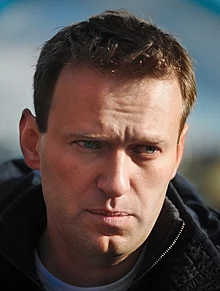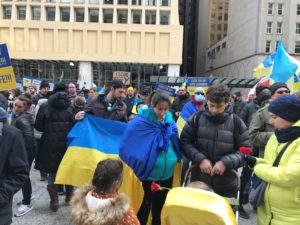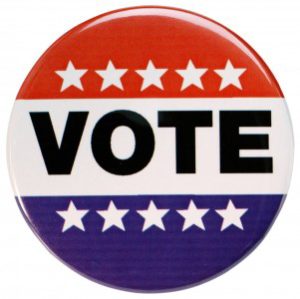Within the last week, I finished reading a nearly 800-page biography of Napoleon Bonaparte, which may raise the question of why I took the trouble. I started only after Donald Trump lost the 2020 election but refused to concede and persisted in disseminating the fiction that the election had somehow been stolen. It struck me that there might be some noteworthy parallels in personality traits, or psychology, with one of the great monsters of European history. There are. Not that I am a psychologist or even play one on television. But as voters, we all judge presidential character to one degree or another. It is often a significant factor in the public debate in election years.
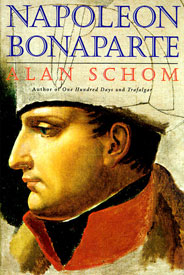 In his detailed but highly readable 1998 biography, Napoleon Bonaparte, Alan Schom notes that, in the end, after numerous avoidable wars, Bonaparte, aka Emperor Napoleon, left behind nearly three million dead Europeans. Most were soldiers, but hundreds of thousands of civilians were also killed. Equally large numbers were displaced as hundreds of towns and villages were burned to the ground, amid other rapine and destruction.
In his detailed but highly readable 1998 biography, Napoleon Bonaparte, Alan Schom notes that, in the end, after numerous avoidable wars, Bonaparte, aka Emperor Napoleon, left behind nearly three million dead Europeans. Most were soldiers, but hundreds of thousands of civilians were also killed. Equally large numbers were displaced as hundreds of towns and villages were burned to the ground, amid other rapine and destruction.
I want to note here that, for comparison, I have read several volumes of recent vintage exploring the Trump psyche, family background, and political behavior, including:
In addition, in comparing Trump with previous U.S. presidents, I am aided by the serendipitous circumstance that, in 1997, I undertook what became a 15-year quest to read at least one biography of every U.S. president, starting sequentially with George Washington. (The sequential aspect ceased as I read second and even third biographies of some presidents, such as Lincoln, Madison, Wilson, and others.) Thus, I do not speak loosely in saying that Trump is decidedly unique in certain respects.
But back to Napoleon.
The destruction I noted above is bad enough, but what became supremely clear to me was how little Napoleon seemed to care. I was reminded of a scene early in Leo Tolstoy’s classic, War and Peace, in which Napoleon, dressed in a Polish peasant soldier’s uniform to escape notice from the Russians, surveys the landscape on the other side of the Niemen River as he prepares for his disastrous invasion of Russia in 1812. As he does so, some cavalry soldiers plunge into the river to demonstrate their courage to the great leader but end up drowning. Tolstoy drily observes that their demise attracted little notice from the emperor.
Not like he really cared, Tolstoy seems to be telling us. Somewhat like Donald Trump slipping away to the White House to view the mayhem on television while his followers, incited by his outlandish rhetoric, ransack the Capitol and some people are killed. Zealots can pay an extraordinarily high price for failing to realize that their self-centered messiah in fact has a heart of stone.
But Napoleon was far worse than that, I learned from Schom. Throughout a decade and a half of senseless wars, in which hundreds of thousands of young French men were conscripted into his army, Napoleon never bothered to authorize a fully operational military medical service to take care of the sick and wounded. Tens of thousands died from appalling field hospital conditions, if they were in any hospital at all. It was just not one of the emperor’s priorities. As Schom notes, “With the same cold, calculating ruthlessness, Napoleon ignored the dead and wounded, and despite the pleas of the army’s chief surgeon, Dr. Dominique Larrey, year after year refused to create a permanent army medical corps.”
Medical supplies tended to be skimpy or nonexistent, and at the Battle of Wagram, Schom notes, “9,000 or so casualties were all but abandoned by Napoleon.” By the time he fled from Russia, having started with an army of more than 600,000, he left behind 400,000 dead soldiers and perhaps 100,000 prisoners in the hands of the Russian empire. Little more than a rump force made it back to Paris with him. His downfall came little more than a year later, leading to his exile in Elba, followed by his return, final defeat, and exile to St. Helena, where he died of arsenic poisoning, most likely at the hands of a trusted associate.
Beware how you choose your champions.
Americans, until recently, have seldom had to confront the consequences of such narcissistic leadership devoid of any capacity for empathy. Presidents of both parties have typically been humbled by the responsibilities they have assumed, and despite mistakes and bad judgment in many cases, have been aware at some level of the cost their decisions have imposed on American soldiers and civilians alike. Remorse has often driven them to seek to remedy the situation. But we have just outlived the experience of a president capable of separating children from their parents at the border without even the most fundamental understanding of the causes of migration from poor nations in Latin America, nor any plan for how someday to reunite them. We have witnessed a presidency in which, as I write, almost 440,000 Americans have died from COVID-19 (exceeding American deaths in World War II) while the nation’s leader ridiculed people for wearing masks and suggested drinking cleaning fluids, all while suppressing the input of capable scientists, but has yet to express any serious regrets for the sorrowful outcome. After all, someone else caused the problem—Obama, the Chinese, Democratic governors, whoever. Yes, Napoleon Bonaparte, from start to finish, is replete with examples of the French leader blaming everyone around him for every catastrophe while failing to accept responsibility. The routine is drearily familiar.
Both men have also exhibited an outsized capacity for surrounding themselves with sycophants and turning at least part of the state apparatus into a family enterprise. We are familiar these days with the coterie of Ivanka Trump, Eric, Donald Jr., and Jared Kushner all playing prominent roles in the White House for which they were profoundly unqualified. Napoleon made kings and princes of his family members, but unlike Trump, often found them incompetent after having installed them. He was also infamous not only for looting the treasure of conquered nations but also of France itself. In his quest to blockade British commerce, he virtually impoverished an entire continent with the “Continental System,” while forcing subordinate states to support the costs of his wars.
The key difference between the two men in this respect is not their cupidity, but their timing. Napoleon rose to power within a nascent French republic that was struggling to establish stable institutions following the insanity of the French Revolution and its wild swings of the political pendulum. He was able to install himself as First Consul through a coup d’etat. He then installed his brother Lucien as Minister of the Interior, a post that put him in charge of the election machinery for a plebiscite to affirm Napoleon’s reorganization of the government. Schom reports that some five million French citizens voted, only 1.5 million for the new constitution, but Lucien remedied the problem by simply stealing the election, reporting more than 3 million positive votes and only 1,562 opposed. Napoleon made this possible by shutting down critical press outlets. He repeated this feat in a later plebiscite that established him as emperor in 1804.
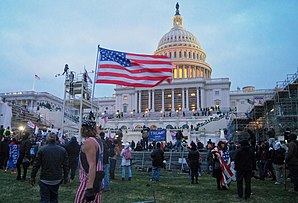
Storming of the Capitol. Image from Wikipedia at https://en.wikipedia.org/wiki/2021_storming_of_the_United_States_Capitol.
If Trump had any serious knowledge of history, he might have envied this Napoleonic sleight of hand, but it is certainly clear that he kept his followers on a short leash of credulity by ranting endlessly about “fake news.” The dangers of this credulity, including the impact of the Q Anon conspiracy phenomenon, became perilously apparent on January 6. Fortunately, the inherent stability of the federal government of the United States after nearly two and a half centuries of tradition and loyalty to democratic principles made the American state far less vulnerable than the French state at the end of the eighteenth century. We were able to move Donald Trump out of the White House, but a cost we have never before experienced with the singular exception of the Civil War.
The single huge difference between the two men is the one that is probably most significant. Napoleon was especially dangerous because, unlike Trump, who was born in the lap of luxury and escaped military service during the Vietnam war because of deferments, he rose from obscurity in Corsica when his father procured a royal scholarship for his education at the Royal Military School, followed by strict military training at the Ecole Militaire in Paris. Napoleon was nothing if not a military leader, sometimes a reckless one, with artillery training and a solid knowledge of mathematics. Trump was largely an indifferent student and one who later lacked an understanding of military culture and operations. Pentagon professionals, aware that their oath prohibited them from following unlawful orders, often took umbrage at Trump’s attempts to override their judgment and concerns. Many retired and former officers spoke out, their numbers growing as time wore on. This standoff between authoritarianism and patriotic tradition may have spared us much further tragedy.
I would prefer not to have found a need to produce this short essay. Trump is at least out of office, though what further mischief he may foment remains to be seen. The critical lesson is for the American people to think much harder about the nature of democratic leadership. We need to become much more discerning of the character traits of the people we elevate as leaders. With many Republicans still clinging to a virulent defense of Trump, and Senators and others clearly prepared to assume his mantle and claim his base for their own, this issue remains volatile. The fate of the world’s most powerful democratic republic hangs in the balance.
Jim Schwab

